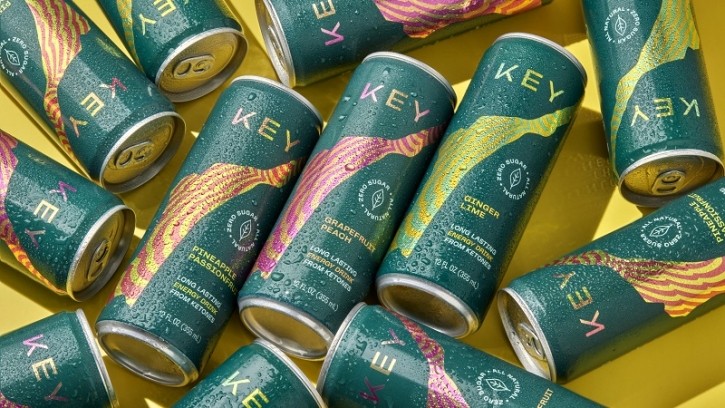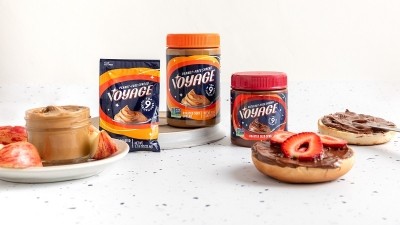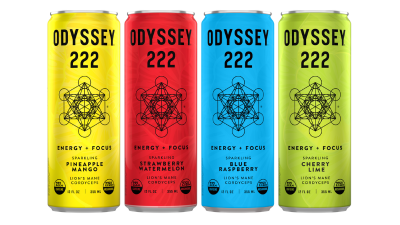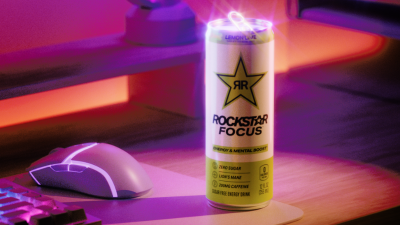KEY unlocks potential of ketones in energy-drink category with help of $4m investment

Currently, KEY offers three flavors — Pineapple Passionfruit, Grapefruit Peach and Ginger Lime — available to purchase from the brand's website, Amazon and Erewhon stores in Southern California. KEY also secured a deal with its distributor KeHE to launch into more retailers in the coming months, said brand Co-founder Tekla Back, who previously served as an executive for PepsiCo.
KEY is formulated with 11.5 grams of Avela pre-ketones, a natural ketone made from fermentation, to provide its energy-boosting benefits. Typically, ketones are released from the liver into the bloodstream, providing the body with energy. This ingredient thus supports the body’s ability to make energy, Back claimed.
Additionally, KEY contains 80 grams of green tea caffeine for additional energy-boosting and is sweetened naturally with stevia for zero calories. An 8 ounce cup of coffee includes 80 grams of caffeine, and the average energy drink has 200 grams of caffeine.
“What is unique about us is that we are not just clean energy. We are real genuine energy. So, if you look at the energy drink market right now, the innovation — if you call it innovation — is just jacking up caffeine. There is a clear whitespace that we identified where we ... can launch an energy drink that is low or no caffeine and sugar-free because we have a new energy source called ketones,” said brand Co-Founder Karishma Thawani, former procurement analyst at Coca-Cola.
KEY raises $4m in seed funding, led by AgFunder
At launch, KEY revealed that it raised $4m in an oversubscribed seed round, led by private equity firm AgFunder and with additional backing from beverage-focused venture capital firm Alethia.
"We come maybe a tad more proven than the first-time startup founder, and we have real tech in the product. We have differentiation out of the gates on the product and plan to build the same for the brand. We were fortunate in that our investors are someone who understands the intersection of tech and consumer with AgFunder," Back said.
While the funding round was not “an easy raise,” KEY was able to attract investors who understood the business and came from the beverage and food-tech world, Back said. The brand plans to use “that playbook for the next round” and focus on investors who understand the brand's vision, Thawani added.
“Yes, it is about having 100 VC calls, but it is also finding the investors who believe in the founders, the science, the product and the value of the brand. So, I think once all of that clicks, you find your perfect investors. We did, and hopefully, for the next time, we will have amazing sales numbers because this is such an amazing energy drink,” Thawani said.
Caffeine concerns rise, but consumers still demand energy-boosting benefits
KEY's release comes at a time of increased scrutiny over the level of sugar and caffeine in energy drinks. Recently, Connecticut lawmakers proposed a ban on energy drink sales to those under 16 years of age, and influencer Logan Paul's energy and sports drink brand, PRIME, is being sued over caffeine content concerns.
“When energy drinks first came out, they were full of sugar. So, sugar was the source of energy. 50 grams of sugar, so massive sugar rush and then a crash," Back said.
She continued, “With this whole shift to taking [sugar] out of the diet, what the energy manufacturers did is they took sugar out, but they jacked up the caffeine. So, now caffeine levels are like 200-300 milligrams, levels that are causing issues in some channels like food service, and FDA is trying to clamp down on them.”
Despite these concerns, many consumers are not ditching caffeine entirely but switching the sources of where they get it, Back explained. Most consumers (71.3%) plan to make no changes to their caffeine intake, with 11% of shoppers saying they will drink somewhat less caffeine in 2024, according to a Statista survey of 1,300 consumers.
“There has been a whole shift towards how do beverage players take share from tea and coffee, which are the original sources of caffeine, so there is a whole play around ready-to-drink coffee drinks, ready-to-drink, tea drinks, etc. And then the original energy drink, you have Pepsi and Diet Coke, and everyone's moving away from soda. So, there is also a huge opportunity [to] giving people a healthier alternative to that,” Back said.






















